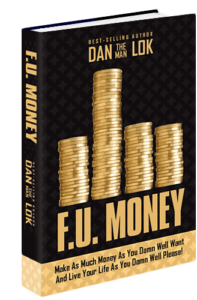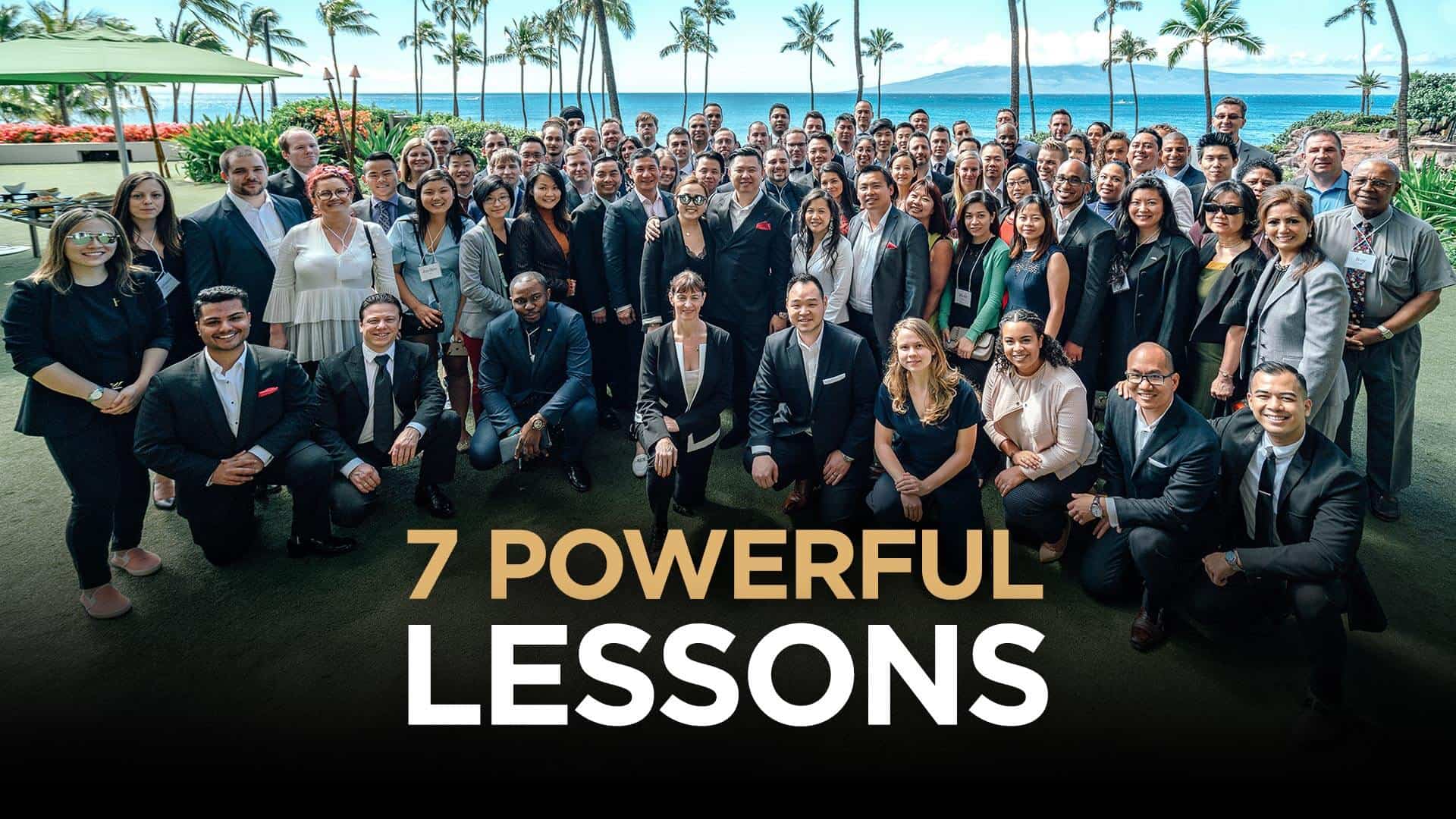Imagine if the YouTube kid celebrity you’re watching on your screen is the next Mark Zuckerberg. Or next Vera Wang. Or next Kylie Jenner.
You can’t always predict what will happen in the future.
The first part of my life was a bit of a disaster and nothing like the success I have now.
My childhood sucked. I was born in Hong Kong and I immigrated to Hong Kong to Canada years ago with no money and no connections and not a word of English.
Growing up, I was only one of three Chinese in my school, so I was an outsider. I didn’t get along with the other kids, who made fun of me and teased me. I got beat up a couple times.
My mom and dad got divorced when I was 16 and that was one of the reasons we immigrated to Canada. I wasn’t one of those people that was born with big dreams. I didn’t have great talents. My teachers said I had average intelligence. I dropped out of college.
Not in a million years would I have imagined myself doing what I’m doing today, writing books, speaking in front of thousands of people, and mentoring millions of entrepreneurs around the world.
It was my dysfunctional childhood that made me the functional achiever that I am today. My parents’ divorce and my tough time in high school both also had a part. It’s because I was the only child in my family that I had to learn how to stop being a boy and grow up so I could take care of my mom.
Now, after building 21 companies and starting a global movement for entrepreneurs, I want to share with you seven powerful lessons I learned when building this business empire.
Watch this video about seven lessons I learned on how to build an empire.
Lesson 1: Adversity Is Your Advantage
People look at their childhood as wounds. I see adversity as your greatest advantage. I hope your childhood sucked too. Because going through difficult times is like a workout for your emotions and your psyche.
When you work out at the gym, you tear your muscle fibers and when they grow back, they are stronger. That’s the first lesson I would like to share with you. Don’t look at your past as your wounds. They’re your muscles.
Business is not a sport for the wannabe. Business is tough. I failed at 13 businesses before having my first success. Statistically, 96 percent of businesses fail within the first 10 years. So in ten years, only four businesses would still be here.
The game of business is for the ambitious, not the weak. It’s for the committed, who will do whatever it takes to succeed, as long as it’s moral, legal, and ethical. I haven’t met a super successful person in my life who hasn’t overcome a lot of adversity.
I’ve lost over two million in business. It doesn’t mean I’m smarter or more talented. It just means I’ve made more mistakes.
Lesson 2: Love What You Do
There’s a saying, “Do what you love and the money will follow.” That’s a load of crap. So many people follow their passion, yet they wonder where their money is. If you want to follow your passion, you’d better make sure your passion makes you money.
For example, I love teaching and speaking about business at events. I could do that all day. The problem is, I hate travelling. I don’t even like to commute to work. I work from home. So imagine how I must feel about travelling from city to city. But I am willing to do what I don’t like to do because that allows me to do what I do like to do.
You would be exceptional at what you do because the marketplace will always pay for value. So it’s not about the money. It’s about choices and lifestyle. In my book, F. U. Money, I talk about financial freedom.

Want to find out more about financial freedom? Download the F.U. Money ebook or audio version here.
Freedom is not the ability to do whatever you want. Freedom is the luxury of not having to do something when you don’t want to. It makes no sense when you work hard and you still struggle to make ends meet.
I believe entrepreneurs who do a good job and deliver value to the marketplace deserve to be well paid. Money earned is a byproduct of value creation. The more money you make, the more value you deliver. Most successful people are successful because they serve a lot of people.
You deserve to make a nice profit and feel good about it.
When you learn how to make money, it is a gift. You’re morally obligated to make as much money as you can.
Lesson 3: Save Yourself Before You Save The World
The best way to help the poor is not to become one of them. It’s your responsibility to maximize your profits as an entrepreneur.
Here’s an analogy. If you’re giving blood, how many bags of blood can you give before you pass out and die? That’s employee mentality: one person, one donation. You want to give blood? Build a hospital. That’s entrepreneurial mindset.
So maximize your profits. Now some people say that “Money isn’t that important,” and “Money doesn’t buy happiness.” People usually say that as a defensive statement, or they don’t have any money or they don’t know how to get some.
Money is only supposed to do two things. First, it gives you comfort. Second, it allows you to extend what you do beyond your physical presence. So think big. Think about how you can grow your business and reach more people.
Most businesses fail because they aren’t getting enough attention in the marketplace. If you want to grow your revenue, your brand, your company, you must get attention.
Attention is the new currency. Are there any products and services in your industry that are lesser in quality than what you’re offering but they’re selling more? The reason is they’re committed to getting attention.
For example, I have a YouTube channel where I upload my videos, a podcast called The Dan Lok Show, and blogs on my website. That’s all free content. But that’s not how I make my money. That’s something I do to promote my brand.
You have to get yourself out there to push your name. There’s so much noise out there on the marketplace nowadays. One tweet or one Facebook post is not enough. Don’t think in terms of one. Think bigger. Not one tweet. A thousand tweets.
It also means when you’re getting attention, not everyone will like you. First they will ignore you… then they will laugh at you… then they fight you. Then you win.
Lesson 4: Promotion Over Creation
Visibility is more important than ability. Spend time promoting your brand. Every day I have Facebook posts. Instagram posts. Blogs. YouTube content. Emails to subscribers.
I’m very focused on promoting my brand and selling what products and services I already have. Then, when I reach a certain level of success, I create more products and services.
You’ll get some haters when you promote yourself. It doesn’t matter. You’re getting attention.
Lesson 5: Stop Pretending And Start Asking
Entrepreneurs who say their business is fine are using an acronym.
Freaked out
In debt
Not making enough money
Emotionally stressed out
Here’s some inside information. When I go to a speaking gig for a thousand people, only about five percent will come up and talk to me afterward. And out of the five percent, less than one percent will follow up.
They would come up to me and tell their stories. I love to hear their stories. They spend 20 minutes telling me what they do. But they never ask me, “Dan, what do you think?”
Here’s a tip. If you want to establish a relationship with powerful, successful people, don’t go up to them and pitch your stuff. It sounds like you want them to endorse your products to their clients and partners even though they don’t know you.
Here’s how to follow up after a speaking gig. Don’t give them your business card. It’s not their job to follow up with you. They’re already successful. It’s your job to follow up with them. Ask for their contact information.
After that, ask them two questions.
- How can I learn more from you?
- What’s your most important project that you’re working on that I or my network can add value to?
Lesson 6: Master, Don’t Dabble
A lot of entrepreneurs have shiny object syndrome. They follow whatever is the flavour of the week or the flavour of the month. They never take the time to master anything.
In my career, I focused on building one skill before the next. First, I focused on marketing, then internet marketing, then management leadership, then deal making, then investing. But it was one thing at a time.
And even when you’re working on mastering a skill, you don’t have to get it right, you just have to get it going. Most entrepreneurs spend too much time thinking about what they want to do.
Remember: perfection is the enemy of progress.
So you wrote an article you don’t like. It doesn’t matter. Upload it. You wrote a blog post you don’t like. It doesn’t matter. Upload it. Tweet the crap out of it.
Reid Hoffman, the founder of LinkedIn, said, “If you’re not embarrassed by the first version of a product, you’ve launched too late.”
Let my words ignite the power, the drive and the desire within you. Just go out there and just do it. Forget the naysayers, ignore these people and just do whatever it takes to achieve your goal and just do it.
Do you want to know how millionaires actually think? Click here to find out more about Dan On Demand where I reveal the secrets to developing the millionaire mindset.



